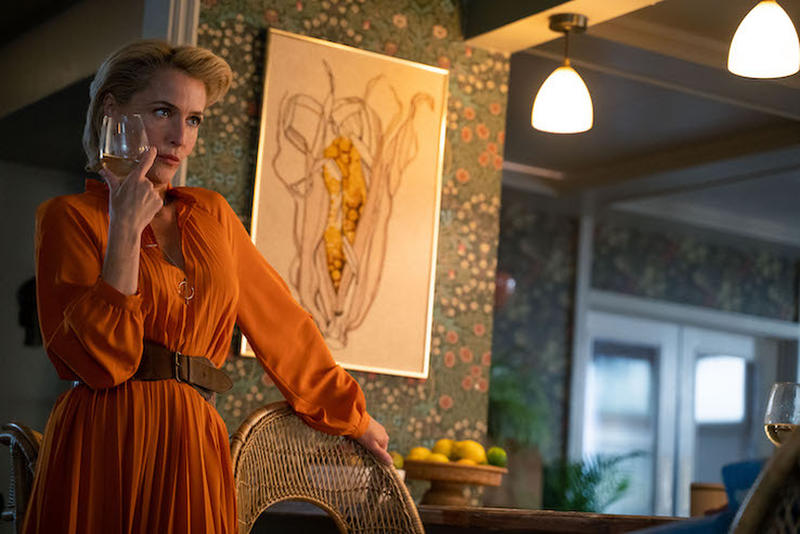
October 18 is World Menopause Day and we’re celebrating it. Menopause is woefully underrepresented in TV and movies, even more so than menstruation, and that’s saying something. So let’s mark the occasion by discussing a few shows and films that break the barrier, ignore the taboo and actually talk about menopause.
Let’s start with Phoebe Waller-Bridge’s acclaimed comedy Fleabag. The Prime Video/BBC show made headlines for several reasons, one of them when it aired season two back in 2019. Kristin Scott Thomas had a guest role in episode three where she plays Belinda. She’s just won the Best Woman in Business award and she ends up having a drink and chatting with Fleabag (Waller-Bridge). Belinda is 58 and imparts some wisdom to Fleabag, who’s 33.
“Women are born with pain built-in. It’s our physical destiny. Period pains, sore boobs, childbirth…,” Belinda says. “We have pain on a cycle for years and years and years. And then, just when you feel you’re making peace with it all, what happens? The menopause comes. The f*cking menopause comes and it is… the most wonderful f*cking thing in the world.” She goes on to talk about how your pelvic floor crumbles — get those Kegel exercises on! — and you have hot flashes, but then you’re free. “It is horrendous but then it’s magnificent, something to look forward to,” she tells Fleabag.
It’s difficult to find another example of menopause being addressed in such a direct and specific way — the pelvic floor is not something often mentioned or referred to in film or TV. Not for nothing, Fleabag went on to win six Emmy awards and has become a symbol of contemporary feminism. But we found a few more M-word representations out there.
More Representation of Menopause in Film and TV

Netflix’s very pedagogic Sex Education has been enlightening viewers of all ages for three seasons about all things sex. Its season two finale, which aired in 2020, saw Jean Milburn — played by the always flawless Gillian Anderson — having a conversation with her doctor about the possibility of being perimenopausal, which happens during the transitional period to menopause. “I’ve been feeling very tired and sort of heavy. And I’ve had this intermittent tight feeling around my chest,” Jean tells her GP (general practitioner). Jean, who’s a doctor herself and knows her facts, explains how perimenopause can cause surges in adrenaline. The GP thinks she’s suffering from a broken heart, but she still orders some tests.
In the end, Jean turns out to be both perimenopausal and pregnant because that makes for better TV. The conversation she has with her GP is a good example of how to listen to our bodies and recognize certain signs though. But it’s especially crucial in its portrayal of how to have a frank chat with a healthcare professional.
In episode ten of season three of Ilana Glazer and Abbi Jacobson’s Broad City, best friends Ilana (Glazer) and Abbi (Jacobson) are on a plane when Abbi gets her period. They promptly embark on a search for a tampon. Abbi asks an older woman, played by Marcie Lynn Ross, if she has one.
“I’m flattered you asked, even though many women my age experience spotting,” the woman tells Abbi. The younger one confesses she’d totally forgotten about menopause. “Menopause isn’t represented in mainstream media. Like no one wants to talk about it,” the woman says but, by that point, Abbi has already disappeared. And the whole sketch, which aired in 2016, perfectly symbolizes how the subject tends to be treated in pop culture. In fact, putting together this article was a challenge altogether because there aren’t that many references to menopause in film or television.
Actress and TV creator Pamela Adlon talks about it in her FX dramedy Better Things, where she plays Sam, a comedian and single mother of three daughters who live in Los Angeles. The show includes a televised comedy bit by Sam in its season four finale in which she talks about the intricacies of being a woman and aging. The episode ran in 2020. “Menopause, it’s the grossest thing in the world. No one wants to hear about it, which is why nobody ever prepared you for it,” Sam says with her three young daughters intently looking at her on a TV screen. “Why don’t we say this to each other? Women have to say this to each other. Women are afraid to talk to each other. Women should be brothers to each other,” she adds.
The episode and the inclusion of this reference are important because the conversation around menopause is not only important for people who may be experiencing it already or are about to do so, but also for young people who menstruate, so that they fully understand what’s ahead.
Let’s leave our article with a film written and directed by Nancy Meyers in 2003 and you’ll see just the difference that a few years make. Something’s Gotta Give stars Diane Keaton as Erica Barry, a famous playwright who falls in love with her daughter’s (Amanda Peet) boyfriend, Harry Sanborn, played by Jack Nicholson. The first time Erica and Harry have sex, he asks about birth control. He’s used to dating much younger women. “Menopause,” she simply replies. “Who’s the lucky boy?” he offers.
Of course, my main problem with this movie is not how little menopause is addressed — there are no other mentions — but the fact that Keaton’s character would decide to make the age-appropriate choice and stick with Nicholson’s when she could have ended up with Keanu Reeves’ character.
Let’s hope that for future World Menopause Days we have a broader representation of such a regular and natural occurrence.






